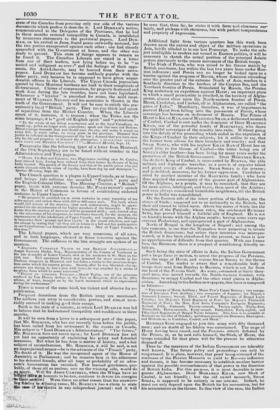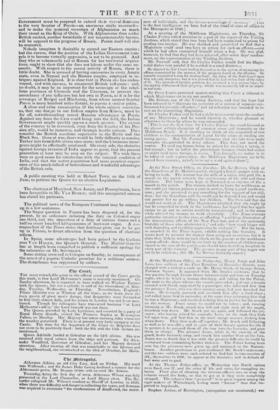Additional light from various quarters has this week been thrown
upon the extent and object of the military operations in Asia, briefly alluded to in our last Postscript. To make the sub- ; ject intelligible to readers not versed in Eastern politics, it will be necessary to sketch the actual position of the principal Asiatic powers previously to the recent movement of the British troops.
The Shah of Persia, who was raised to his throne mainly by British assistance, has within the last two years been under Rus- sian influence; and Persia can no longer be looked upon as a barrier against the progress of Russia. whose dominion extending over the greater part of the extreme North of Asia, reaches in a Southerly direction to the borders of' the Caspian Sea, and the Northern frontier of Persia. Stimulated by Russia, the Persian King undertook an expedition against Herat ; an important place
to which a small principality is attached, in the territory of Afgha- nistan, almost close upon the North-eastern frontier of Persia. Herat, Candahar, and Caubul, all in Afghanistan, are called " the gates of India." Manifestly, therefore, it was of importance to prevent Herat from falling into the possession of Persia, whose sovereign has become an instrument of Russia. The Prince of Herat is KetAal RAN, son of MAHOMED SH AH, a dethroned monarch of Caubul. Caubul is now under the dominion of' DOST MAHOMED KHAN, one of the powerful family of BARUKZYES, who drove the rightful sovereigns of the country into exile. Without going into the details of the proceeding which ended in the expulsion of the Kings of Caubul by their subjects, let it suffice to say, that the former were odious for their treachery and cruelty; and that SHAH SOOJA, who with his nephew KHASI RAN of Herat has an equal title to the throne of Caubul—the latter being son of SOOJA'S elder brother—has been living for many years under the
protection of the British GOVCIIIIIIela. DOST MOHAMED KHAN, the de facto King of Caubul, is represented by BURNES, the able
military and diplomatic traveller, as a person of superior talent and great energy of character. SHAH SOOJA is the reverse; and is disliked, moreover, for his former oppression. Candahar is ruled by another member of the BARUKLYE family ' • who have thus acquired the sovereignty of the greater part of Afghanistan. Of the Afghans, as a people, it may be remarked, that they are far more active, intelligent, and brave, than most of the Asiatics; and were always considered formidable neighbours, till the British power in India was consolidated.
On the Eastern side of the lower portion of the Indus, are the states of Shade; supposed not to be unfriendly to the British, but
their aid cannot be relied upon. Above the states of Smite lies the kingdom of the Punjaub; whose ruler, the celebrated RUNJEET SING, has proved himself a faithful ally of England. He is not on friendly terms with the Afghan people; having some years ago overruns Peshawaur, and appropriated a part of Afghanistan. North of Bengal is the kingdom of Nepaul ; and among the late rumours, is one that the Nepaulese were preparing to invade the British dominions; but either their intention was misrepre- sented, or it has been abandoned for the present, as there is now no apprehension of difficulty from that quarter. With our former foes, the Burmese, there is a prospect of eetablishing friendly re- lations.
Such being the state of affairs in Asia, the Indian Government put a large force in motion, to arrest tine progress of the Persians,
raise the siege of Herat, and restore SHAH SOOJA to the throne of Caubul. Tine reader is aware that a considerable body of troops Were sent from Bombay to Bushire, which is not far from the head of the Persian Gulf. Au army, estimated at thirty thou- sand men, was moved towards the North-western frontier, with directions to occupy Caubul and the other chief places in Afgha- nistan. According to the Indian newspapers, this force is composed as follows- " Two troops of Horse Artillery ; Major Pew's Camel Battery ; two compa- nies of European Foot Artillery ; two companies of Sippers; her Majesty's Sixteenth Lancers; Second, Thitd, and Fourth Regiments of Bengal Light Cavalry; her Majesty's Third Regiment of Foot; her Majesty's Thirteenth Regiment of Foot ; the Hon. East India Company's European Regiment ; Second, Fifth, Sixteenth', Twenty-seventh, Twenty-eighth, Thirty-first, Thirty-fifth, Thirty-seventh, Forty-second, Forty-third, Forty-eighth, and Fifty-third Regiments of Bengal Native Infantry. This force is to assemble at Kurnaul on the thIst of October; and thence proceed via Mower, hhawupoor, and Mitheukate, to Candahar, Caubul, and Herat."
RUNJEET Sten engaged to join this army with fifty thousand men ; and no doubt of his fidelity was entertained. The siege of Herat having been raised, and the Persians utterly defeated by tine Prince, or, as he now calls himself, the Shah, of Herat, the troops intended for that place will for the present be otherwise disposed of.
Thus far the measures of the Indian Government are tolerably well known. The future policy and proceedings can only be conjectured. It is plain, however, that proof being obtained of the readiness of the Persian Monarch to yield to Russian influence • and threats, it has become necessary to establish another barrier against the possible encroachments of that power in the direction of British India. For this purpose, it is most desirable to reor-
ganize Afghanistan. DOST MOHAMED KHAN, now Shah of Caubul, is not friendly • but the old exiled monarch, SHAH
SOOJA, is supposed to be entirely in our interest. Indeed, he must not only depend upon the British for his restoration, but for his maintenance on the throne. In this view of the case, the Indian
Government must he prepared to extend thar virtual dominion to the very frontier of Persia—an enormous stride westward—
and to make the nominal sovereign of Afghanistan as much their vassal as the King of Oude. With Afghanistan thus under British control, another formidable if not insurmountable barrier, will be opposed to the progress of Russia. Persia itself will also be overawed.
Nobody imagines it desirable to extend our Eastern empire ; but the excuse, that the position of the Indian Government com- pels it to become virtually aggressive, is not to be gainsaid. And they who so vehemently rail at Russia for her territorial acquisi- tions, ought to show that she does not labour under the same ne- cessity. With respect to the recent activity of Russia, there is little doubt. She is accused of having emissaries in every Asiatic state, even in Nepaul and the Birman empire, employed in in- trigues against England. It is clear that in Persia she has endea- voured, and with success, to nun erect British influence : and, no doubt, it may be as important fr the sovereign of the rebel- lious provinces of Circassia and t e Caucasus, to prevent the ascendancy of any influence but het own in Persia, as it is for the sovereign of Bengal and Hindosta 1, from whose nearest frontier Persia is many hundred miles distant, to pursue a similar policy.
A close and calm examination ,61 the whole subject convinces us, that any danger to our Indian empire from Russia, must be far off, notwithstanding recent Russian advantages in Persia. Against any force the Czar could bring into the field, the Indian Government might quickly oppose a much greater. The extent of the country to be traversed, even front the fiontier of his Per- sian ally, would be immense, and through hostile nations. Theis consider the British maritime superiority in the Baltic and the Black Sea. Once at war, there would be little difficulty in rousing Turkey into formidable action once more; and the Circassian insur- gents might be effectually reinforced. On every side, the obstacles against foreign invasion of India appear so great, that the present generation at least may be easy on the subject. We wish there were as good cause for satisfaction with the internal condition of India, and that the native population had more practical experi- ence of the much-talked of benevolence and wonderful advantages of the British rule.



























 Previous page
Previous page